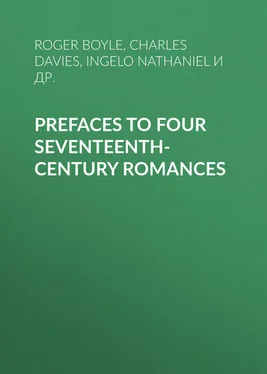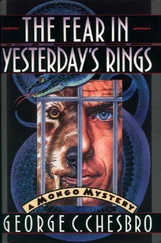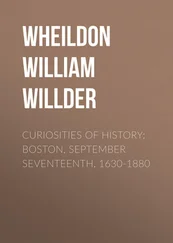George Mackenzie - Prefaces to Four Seventeenth-Century Romances
Здесь есть возможность читать онлайн «George Mackenzie - Prefaces to Four Seventeenth-Century Romances» — ознакомительный отрывок электронной книги совершенно бесплатно, а после прочтения отрывка купить полную версию. В некоторых случаях можно слушать аудио, скачать через торрент в формате fb2 и присутствует краткое содержание. Жанр: foreign_antique, foreign_prose, на английском языке. Описание произведения, (предисловие) а так же отзывы посетителей доступны на портале библиотеки ЛибКат.
- Название:Prefaces to Four Seventeenth-Century Romances
- Автор:
- Жанр:
- Год:неизвестен
- ISBN:нет данных
- Рейтинг книги:5 / 5. Голосов: 1
-
Избранное:Добавить в избранное
- Отзывы:
-
Ваша оценка:
- 100
- 1
- 2
- 3
- 4
- 5
Prefaces to Four Seventeenth-Century Romances: краткое содержание, описание и аннотация
Предлагаем к чтению аннотацию, описание, краткое содержание или предисловие (зависит от того, что написал сам автор книги «Prefaces to Four Seventeenth-Century Romances»). Если вы не нашли необходимую информацию о книге — напишите в комментариях, мы постараемся отыскать её.
Prefaces to Four Seventeenth-Century Romances — читать онлайн ознакомительный отрывок
Ниже представлен текст книги, разбитый по страницам. Система сохранения места последней прочитанной страницы, позволяет с удобством читать онлайн бесплатно книгу «Prefaces to Four Seventeenth-Century Romances», без необходимости каждый раз заново искать на чём Вы остановились. Поставьте закладку, и сможете в любой момент перейти на страницу, на которой закончили чтение.
Интервал:
Закладка:
Roger Boyle, Sir George Mackenzie, Nathaniel Ingelo
Prefaces to Four Seventeenth-Century Romances / Roger Boyle, Lord Broghill, preface to Parthenissa (1655) Sir George Mackenzie, «Apologie for romances,» prefixed to Aretina, the serious romance (1660) Nathaniel Ingelo, preface to Bentivolio and Urania (1660) Robert Boyle, preface to Theodora and Didymus (1687)
INTRODUCTION
The four Prefaces here reprinted occupy a place in the long argument about Romance somewhat apart from the developments which preceded the emergence of the novel proper in eighteenth-century England. The secret antinomy in their authors with regard to the art they are practising is as clearly revealed by the compulsion to give Romance a new and, above all, a serious purpose as by the embarrassing discovery of so much that was otiose in the already existing forms. At heart they shared with Arnauld the opinion he expressed of Scudéry’s Clelie in his famous letter to Perrault. “Que ce soit, si vous voulez, le plus beau de tous les Romans; mais enfin c’est un Roman. C’est tout dire.”
A further insight into their ideas and purposes is gained if one remembers the part they played (Mackenzie and Robert Boyle especially) in the experimental crisis through which seventeenth-century rhetoric was passing. All four works were written in self-imposed styles and were attempts to discover the nature of a common measure for the narrative prose their age demanded. Romance à la Scudéry was never indigenous in English soil. Even Roger Boyle had never succumbed wholeheartedly to its sophistications which explains why his book was so lamely sponsored by diffidence, dubiety and want of will. His language could never compass the idiom in its entirety nor could “the matchless Orinda” (who was Boyle’s friend) command as zealous or intelligent a following as that which crowded the Hôtel de Rambouillet. “ Parthenissa is now my company,” 1 1 Parthenissa is reproduced, with permission, from the copy in the Henry E. Huntington Library, the other works from the copies in the British Museum.
writes Dorothy Osborne, “… I am not very much taken with it though he makes his people say fine handsome things to one another, yet they are not easy and Naïve like the french.” A long tradition, culminating in the Poetics of Scaliger, had established the kind of “truth” both poet and romancer were in search of and contrived a set of schema amenable to variations by even a mediocre talent. Broghill’s plan pays due attention to suspense and elaboration, without which, as Ménage said, “the end would arrive too soon.” He, like others, resorted to history for the balance of the parts and the establishment of vraisemblance in terms of what would address itself to the reader as representative and probable. These were now the commonplaces of the romancer’s art. In his Preface to Birinthea (1664) John Bulteel sets his face against those who “can relish no Romance that is not forced with Extravagant Impossibilities.” The tale, however told, should be limited to the scope of “that predominant faculty of the Soul, the Judgement.” And in 1665, John Crowne, amusingly enough in the Preface to Pandion and Amphigenia had maintained, with an eye to character, that “my endeavours have been rather to delineate humors and affections, than to affect humorous delineations.” Whole volumes filled with “Phlegmatic conceipts” and “such empty inflations, inherit the Office of a foot-ball.” But alas! while Romance endeavoured to bring the heroic into stricter, more reasonable consonance with its ordinary, realistic counterpart of everyday, the extension of range brought about by all the means of emotional contagion produced none but amorphous results. It was Madame de la Fayette who finally achieved the expression of the personal will in a universe of privately conflicting motives, but only by the rigorous exclusion of those elements, literary and historical, which had confused Roger Boyle.
The stylistic aspect of the Romancer’s problem is well illustrated by the Apologie prefaced to his Aretina (1660) by Sir George Mackenzie. This is the critical exercise of a young man in search of a style. Sidney, Scudéry, Barkley and Broghill are his saints and patrons if only because they had shown a distaste for “things impracticable … above the reach of man’s power” such as filled the pages of Amadis de Gaulle . But serious Romance (and Aretina is that) can “strain the christal streams of vertue from the puddle of interest”; it allures “lazy Ladies and luxurious Gallants … to spend in their Chambers some hours, which else, the one would consecrate to the bed and the other to the Bordell.” The one real contribution he makes, however, is in his insistence on avoiding “the style which because of its soaring pitch was inimitable.” In his own writing there is much that savours of copy-book conceits but a style “flourished with similies,” such as “Barrasters” use, is by no means to be condemned. Mackenzie seems to be in two minds, pulled this way and that in response to two guiding notions and allegiances. In his Idea Eloquentiae Forensis Hodierna (1681) he maintains that “Eloquence is not only allowable, but necessary … where Passions are to be excited.” To “the profluvium Asiaticum” of the Codex and the (so-called) novels of the lawyers, he opposes the narrowness of “the short or Laconick Way” which was the only excellence of judges. In his condemnation of bombastic periphrasis and the “carminated” hyperbole of Browne and Charlton, he would have included some, at least, of the pretty effects so carefully studied by “a ridiculous caball of Ladies at Paris.” Nevertheless the one style he recommends is that “where the cadence is sweet, and the epithets well adapted … and this is that style which is used at Court, and is paterned to us by eloquent Scuderie.” He never attained to that kind of writing himself in Aretina but the new style, for all that, was presently to be succinctly catalogued in all its essentials by the members of the Royal Society and was to provide the staple of the English novel when it ventured outside “the circumference of wit” and attained popularity in Defoe and Fielding.
Ingelo takes us at once into the narrower realm of traditional commonplace. “The whole Rhapsody of Homer’s Iliads and Odysseis,” he quotes, “beginning and End, is but a woman.” Even the chastest delights are dangerous to the “Dignity of Reasonable Souls.” Like Ascham, he castigates all those whose “chief design is to put fleshly Lust into long Stories” and laments “the Excellent Wits thrown away in writing great stories of Nothing.” There is nothing new in this or in his effort “to lay the design of Romance deeper than the Shallows of Fancy,” though to do it, he inured himself and his readers “to ingenious schemes of Discourse – Apologues, Parables and such-like modes of signification,” the object being to keep in mind the schematic range of moral values that recommended itself to “little capacities.” There is in him more than a hint of Spenser’s allegory and a curious but uninspired anticipation of The Pilgrim’s Progress . In the Preface to the second part (Books 5 and 6 in the second edition, 1669) he admits he has been prolix and “shorter in the Historical Narrations.” The sisters Theonoe and Irene are concerned to give a better account of their Time to Almighty God than mere narrative can comprehend and Ingelo’s task is to turn men’s minds from the gross errors of the Atheists, the Epicureans, the Scepticks and all those who magnify “the Degeneracy of Humane Nature.” C’est tout dire. The gravamen of his charge against the degenerate beasts of Theriagene and “the Reproach of Many Falshoods” in his concluding book, of the Elenchus , is essentially a recognition that his method is inadequate to the demands he has made on it. The arguments of Hobbes could only be countered by a morality that adopted the subtle calculus of a Descartes and revealed the passions for what they are in the wide orbit and common perspectives of human nature.
Читать дальшеИнтервал:
Закладка:
Похожие книги на «Prefaces to Four Seventeenth-Century Romances»
Представляем Вашему вниманию похожие книги на «Prefaces to Four Seventeenth-Century Romances» списком для выбора. Мы отобрали схожую по названию и смыслу литературу в надежде предоставить читателям больше вариантов отыскать новые, интересные, ещё непрочитанные произведения.
Обсуждение, отзывы о книге «Prefaces to Four Seventeenth-Century Romances» и просто собственные мнения читателей. Оставьте ваши комментарии, напишите, что Вы думаете о произведении, его смысле или главных героях. Укажите что конкретно понравилось, а что нет, и почему Вы так считаете.












